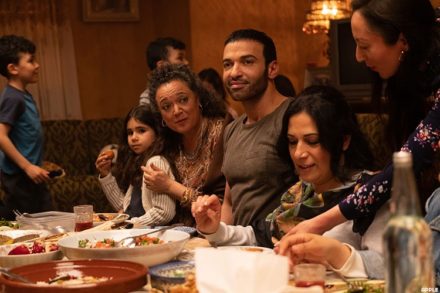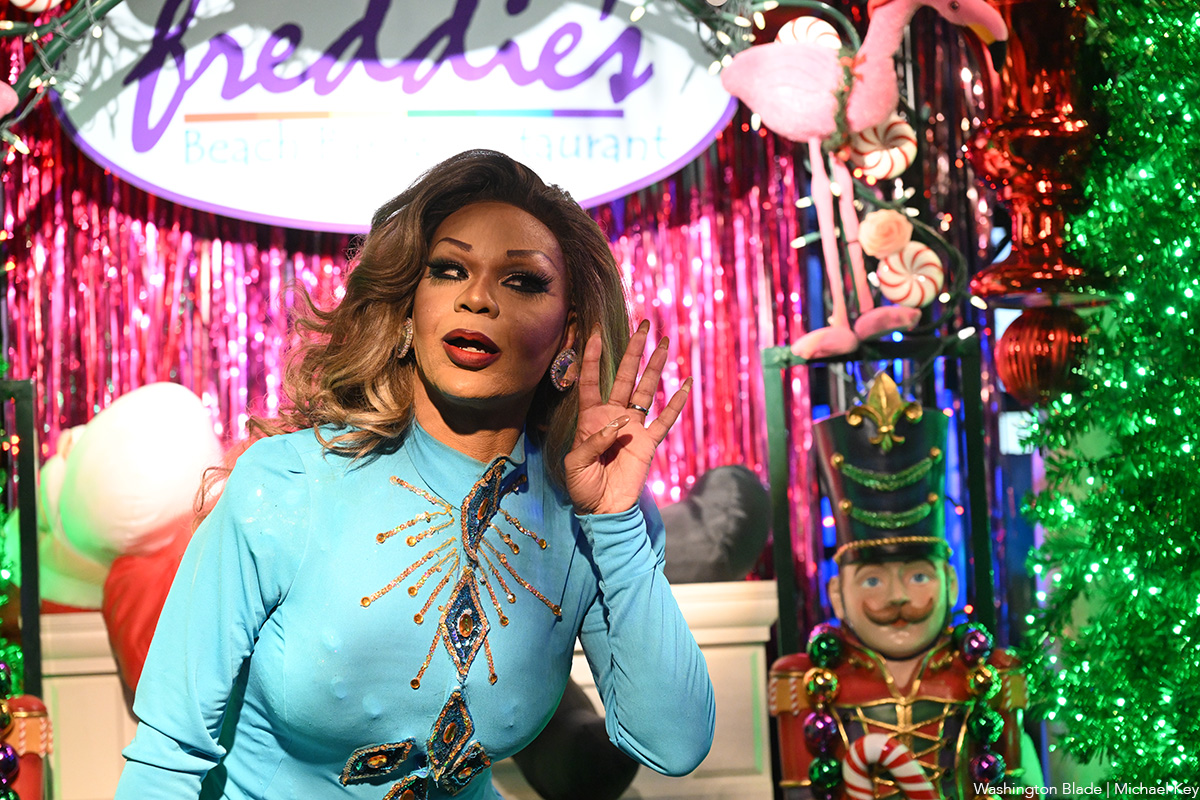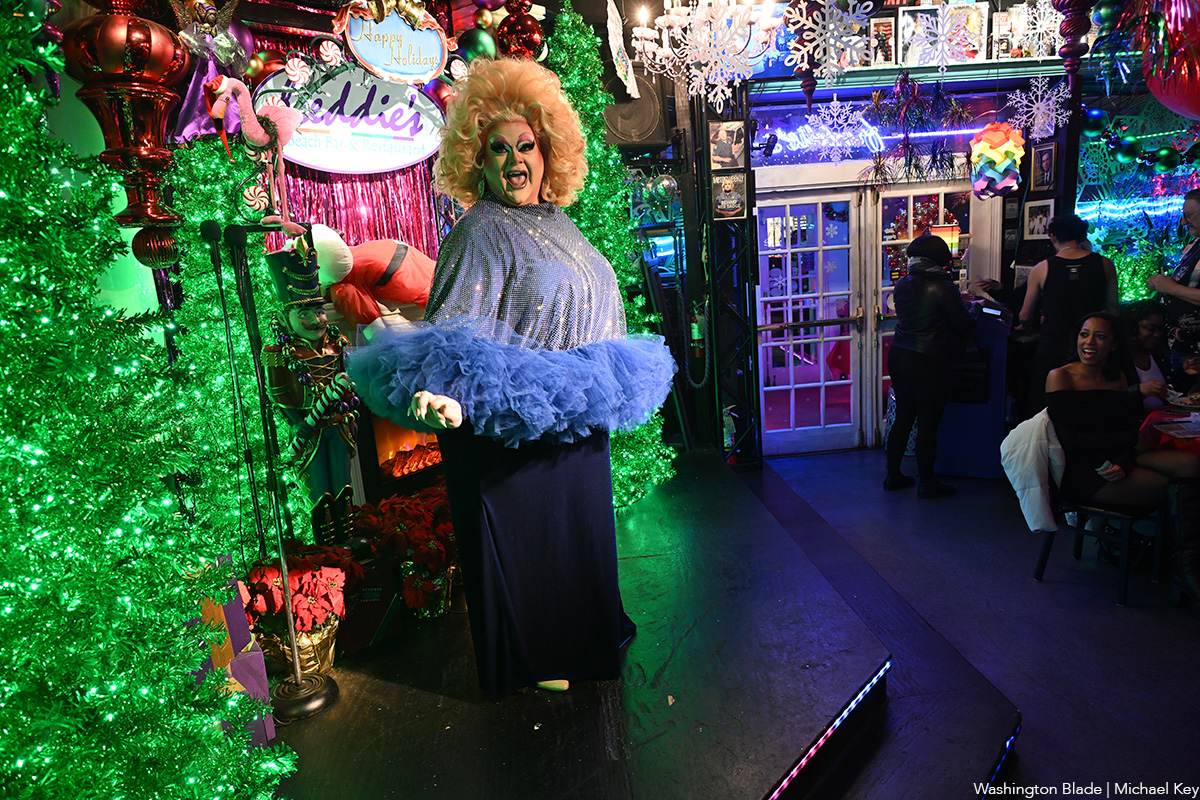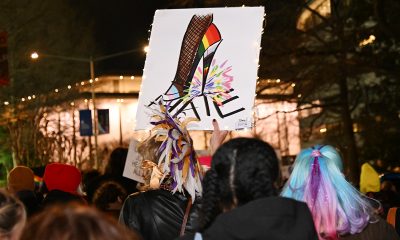Arts & Entertainment
‘Little America’ episode about gay Syrian refugee banned in 11 countries


The LGBTQ-themed episode of the new and acclaimed Apple TV+ series “Little America” has been banned in nearly a dozen Middle Eastern countries.
The series, which debuted on January 17, comes from a writing and producing team that includes “Big Sick” writers Kumail Nanjiani and Emily V. Gordon, alongside “Master of None” co-creator Alan Yang, Lee Eisenberg, Joshuah Bearman and Joshua Davis. It has been lauded by audiences and critics alike, and was renewed by the fledgling streaming platform for a second season even before the first had even premiered.
Based on a true stories series in Epic Magazine, the show’s official description tells us it goes “beyond the headlines to look at the funny, romantic, heartfelt, inspiring and unexpected lives of immigrants in America, at a time when their stories are more relevant than ever.”Each stand-alone episode relates the narrative of a different American immigrant, following the hopes, dreams, and hardships of the immigrant experience. Though the show’s focus is on character and compassion, its stories are inescapably political in today’s oppressively nationalistic climate; as the Pakistani-American Nanjiani recently observed in an interview, “Just by saying that immigrants are human beings with hopes and desires and likes and dislikes in this climate is a radical statement.”
The season’s final installment, which is entitled “The Son,” is the story of Rafiq (Haaz Sleiman), a closeted Syrian man whose inadvertent outing to his family sparks an escape that will ultimately bring him to America. Directed by Stephen Dunn, who also co-wrote with Amrou Al-Kadhi, and based on the real-life story of a Syrian named Shadi, it’s an emotional roller-coaster ride that offers a layered and compassionate document of authentic queer experience; for many LGBTQ audiences, the young protagonist’s journey – his escape from the homophobia and repression of his family and their culture, his building of a “queer family” along the way, and his joy upon finding himself in a place where he can not only finally be free, but be and accepted and loved, just as he is, by the people around him – is profoundly relatable.
The episode faced political obstacles even before it was made. As revealed by Dunn in an interview with Queerty, the episode “almost never happened” because the actor chosen to play Rafiq’s friend Zain (Adam Ali, a Lebanese-born resident of Manchester, UK) was unable to enter America for filming due to Trump’s “travel ban.” Fortunately, the producers and the studio were willing to undergo the considerable difficulty of moving production from New Jersey to Canada – a decision that Dunn says left him “floored.”
Dunn also observed that the real-life Rafiq would have been denied his asylum request if it had been submitted in Trump’s America (the story is set in the mid-2000s), which would have led to a much different outcome for the refugee, who worked with the show’s creative staff to fill in details of his experience during production of the episode.
Now, word has come that the episode has been banned by eleven different nations – ten in the Middle East and Russia – for its LGBTQ content.
On Saturday, co-writer Al-Kadhi, a drag performer from Iraq who identifies as non-binary, tweeted news of the ban, saying “We’ve just found out that our episode in #LittleAmerica has been banned from several Middle-Eastern countries. We’re so sorry and we’re working to make it valuable. If you have experienced this or are noticing changes, please let us know.”
They followed up Monday with another tweet pledging to work toward making the episode available to viewers in the affected countries, saying, “This is the harsh reality of making queer Arab work. The Trump travel ban meant we had to move this shoot out of America. And now our #LittleAmerica episode has been banned in 11 countries. We’re so sorry about this – please know we’re working hard to find a way to get it to you.”
In an interview with Pink News, Al-Kadhi said, “I know lots of queer Arabs and Muslims currently living in the Middle East who feel terrified of expressing themselves, and was desperately hoping that this episode could act like some kind of balm or source of home and comfort for them. It really saddens me to think that they don’t have access to the episode – we are exploring every option possible to get it to them.”
They also added, “It’s the grim reality of trying to tell queer Arab stories in this global climate of far-right nationalism. They don’t make it easy — which is why it’s all the more important we fight like hell to tell them.”
Movies
‘Hedda’ brings queer visibility to Golden Globes
Tessa Thompson up for Best Actress for new take on Ibsen classic

The 83rd annual Golden Globes awards are set for Sunday (CBS, 8 p.m. EST). One of the many bright spots this awards season is “Hedda,” a unique LGBTQ version of the classic Henrik Ibsen story, “Hedda Gabler,” starring powerhouses Nina Hoss, Tessa Thompson and Imogen Poots. A modern reinterpretation of a timeless story, the film and its cast have already received several nominations this awards season, including a Globes nod for Best Actress for Thompson.
Writer/director Nia DaCosta was fascinated by Ibsen’s play and the enigmatic character of the deeply complex Hedda, who in the original, is stuck in a marriage she doesn’t want, and still is drawn to her former lover, Eilert.
But in DaCosta’s adaptation, there’s a fundamental difference: Eilert is being played by Hoss, and is now named Eileen.
“That name change adds this element of queerness to the story as well,” said DaCosta at a recent Golden Globes press event. “And although some people read the original play as Hedda being queer, which I find interesting, which I didn’t necessarily…it was a side effect in my movie that everyone was queer once I changed Eilert to a woman.”
She added: “But it still, for me, stayed true to the original because I was staying true to all the themes and the feelings and the sort of muckiness that I love so much about the original work.”
Thompson, who is bisexual, enjoyed playing this new version of Hedda, noting that the queer love storyline gave the film “a whole lot of knockoff effects.”
“But I think more than that, I think fundamentally something that it does is give Hedda a real foil. Another woman who’s in the world who’s making very different choices. And I think this is a film that wants to explore that piece more than Ibsen’s.”
DaCosta making it a queer story “made that kind of jump off the page and get under my skin in a way that felt really immediate,” Thompson acknowledged.
“It wants to explore sort of pathways to personhood and gaining sort of agency over one’s life. In the original piece, you have Hedda saying, ‘for once, I want to be in control of a man’s destiny,’” said Thompson.
“And I think in our piece, you see a woman struggling with trying to be in control of her own. And I thought that sort of mind, what is in the original material, but made it just, for me, make sense as a modern woman now.”
It is because of Hedda’s jealousy and envy of Eileen and her new girlfriend (Poots) that we see the character make impulsive moves.
“I think to a modern sensibility, the idea of a woman being quite jealous of another woman and acting out on that is really something that there’s not a lot of patience or grace for that in the world that we live in now,” said Thompson.
“Which I appreciate. But I do think there is something really generative. What I discovered with playing Hedda is, if it’s not left unchecked, there’s something very generative about feelings like envy and jealousy, because they point us in the direction of self. They help us understand the kind of lives that we want to live.”
Hoss actually played Hedda on stage in Berlin for several years previously.
“When I read the script, I was so surprised and mesmerized by what this decision did that there’s an Eileen instead of an Ejlert Lovborg,” said Hoss. “I was so drawn to this woman immediately.”
The deep love that is still there between Hedda and Eileen was immediately evident, as soon as the characters meet onscreen.
“If she is able to have this emotion with Eileen’s eyes, I think she isn’t yet because she doesn’t want to be vulnerable,” said Hoss. “So she doesn’t allow herself to feel that because then she could get hurt. And that’s something Eileen never got through to. So that’s the deep sadness within Eileen that she couldn’t make her feel the love, but at least these two when they meet, you feel like, ‘Oh my God, it’s not yet done with those two.’’’
Onscreen and offscreen, Thompson and Hoss loved working with each other.
“She did such great, strong choices…I looked at her transforming, which was somewhat mesmerizing, and she was really dangerous,” Hoss enthused. “It’s like when she was Hedda, I was a little bit like, but on the other hand, of course, fascinated. And that’s the thing that these humans have that are slightly dangerous. They’re also very fascinating.”
Hoss said that’s what drew Eileen to Hedda.
“I think both women want to change each other, but actually how they are is what attracts them to each other. And they’re very complimentary in that sense. So they would make up a great couple, I would believe. But the way they are right now, they’re just not good for each other. So in a way, that’s what we were talking about. I think we thought, ‘well, the background story must have been something like a chaotic, wonderful, just exploring for the first time, being in love, being out of society, doing something slightly dangerous, hidden, and then not so hidden because they would enter the Bohemian world where it was kind of okay to be queer and to celebrate yourself and to explore it.’”
But up to a certain point, because Eileen started working and was really after, ‘This is what I want to do. I want to publish, I want to become someone in the academic world,’” noted Hoss.
Poots has had her hands full playing Eileen’s love interest as she also starred in the complicated drama, “The Chronology of Water” (based on the memoir by Lydia Yuknavitch and directed by queer actress Kristen Stewart).
“Because the character in ‘Hedda’ is the only person in that triptych of women who’s acting on her impulses, despite the fact she’s incredibly, seemingly fragile, she’s the only one who has the ability to move through cowardice,” Poots acknowledged. “And that’s an interesting thing.”
Arts & Entertainment
2026 Most Eligible LGBTQ Singles nominations
We are looking for the most eligible LGBTQ singles in the Washington, D.C. region.

Are you or a friend looking to find a little love in 2026? We are looking for the most eligible LGBTQ singles in the Washington, D.C. region. Nominate you or your friends until January 23rd using the form below or by clicking HERE.
Our most eligible singles will be announced online in February. View our 2025 singles HERE.

The Freddie’s Follies drag show was held at Freddie’s Beach Bar in Arlington, Va. on Saturday, Jan. 3. Performers included Monet Dupree, Michelle Livigne, Shirley Naytch, Gigi Paris Couture and Shenandoah.
(Washington Blade photos by Michael Key)










-

 Sponsored5 days ago
Sponsored5 days agoSafer Ways to Pay for Online Performances and Queer Events
-

 District of Columbia4 days ago
District of Columbia4 days agoTwo pioneering gay journalists to speak at Thursday event
-

 Colombia3 days ago
Colombia3 days agoBlade travels to Colombia after U.S. forces seize Maduro in Venezuela
-

 a&e features4 days ago
a&e features4 days agoQueer highlights of the 2026 Critics Choice Awards: Aunt Gladys, that ‘Heated Rivalry’ shoutout and more




















